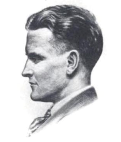The Great Gatsby by F. Scott Fitzgerald
Page 23 of 25 - 1 2 3 4 5 6 7 8 9 10 11 12 13 14 15 16 17 18 19 20 21 22 23 24 25 Purchase full notes for £6.95 (aprox $10.84)
61 ‘At first I din’ notice we’d stopped.’ – This man is extremely drunk, and his taking to the road is emblematic of the supreme carelessness of the party-goers. The incident also serves to reintroduce Owl-eyes to the reader and is also proleptic of the later car accident involving Myrtle.
62 ‘A sudden emptiness seemed to flow now from the windows and the great doors, endowing with complete isolation the figure of the host’ – Gatsby is seen mysteriously alone, just as Nick first encountered him.
62 ‘Reading over what I have written so far, I see I have given the impression that the events of three nights several weeks apart were all that absorbed me.’ – Such narrative games are as old as Don Quixote , but Fitzgerald plays them well. The author is writing a novel, supposedly written by an older version of Nick Carraway looking back over the events of a memorable summer and writing a novel about them. This imaginary novelist then looks back at his first three chapters and points out that he has suppressed details and emphasised others to create a smooth narrative progression – as all novelists do. But of course it is Fitzgerald who is really writing the novel and who is delighting in befuddling and teasing his reader…
62 ‘little pig sausages’ – ‘pork’: an Americanism.
63 ‘I even had a short affair with a girl who lived in Jersey City and worked in the accounting department, but her brother began throwing mean looks in my direction, so when she went on her vacation in July I let it blow quietly away.’ – Another ineffectual relationship with a woman which ends rather anticlimactically, like Nick’s earlier ‘escape’ from his ‘engagement’. The story is probably placed here quite carefully: Nick is introduced as a young man who has almost got himself engaged and as finding Jordan Baker moderately attractive; after this come his – potentially more homoerotic – encounters with Chester McKee and Gatsby. Telling the reader about this conventional heterosexual affair restores the balance, as it were, and helps to keep the whole business of Nick’s true orientation far from certain.
63 ‘a few rioters’ – presumably referring simply to people behaving in a rowdy fashion.
63 ‘the satisfaction that the constant flicker of men and women and machines gives to the restless eye.’ – An image that sets in train an intriguingly cinematic paragraph.
62 ‘A sudden emptiness seemed to flow now from the windows and the great doors, endowing with complete isolation the figure of the host’ – Gatsby is seen mysteriously alone, just as Nick first encountered him.
62 ‘Reading over what I have written so far, I see I have given the impression that the events of three nights several weeks apart were all that absorbed me.’ – Such narrative games are as old as Don Quixote , but Fitzgerald plays them well. The author is writing a novel, supposedly written by an older version of Nick Carraway looking back over the events of a memorable summer and writing a novel about them. This imaginary novelist then looks back at his first three chapters and points out that he has suppressed details and emphasised others to create a smooth narrative progression – as all novelists do. But of course it is Fitzgerald who is really writing the novel and who is delighting in befuddling and teasing his reader…
62 ‘little pig sausages’ – ‘pork’: an Americanism.
63 ‘I even had a short affair with a girl who lived in Jersey City and worked in the accounting department, but her brother began throwing mean looks in my direction, so when she went on her vacation in July I let it blow quietly away.’ – Another ineffectual relationship with a woman which ends rather anticlimactically, like Nick’s earlier ‘escape’ from his ‘engagement’. The story is probably placed here quite carefully: Nick is introduced as a young man who has almost got himself engaged and as finding Jordan Baker moderately attractive; after this come his – potentially more homoerotic – encounters with Chester McKee and Gatsby. Telling the reader about this conventional heterosexual affair restores the balance, as it were, and helps to keep the whole business of Nick’s true orientation far from certain.
63 ‘a few rioters’ – presumably referring simply to people behaving in a rowdy fashion.
63 ‘the satisfaction that the constant flicker of men and women and machines gives to the restless eye.’ – An image that sets in train an intriguingly cinematic paragraph.

